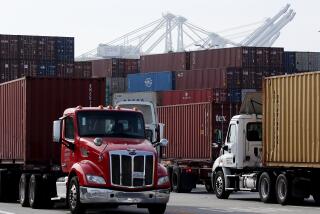SUVs: Is that weight gross?
- Share via
Are the biggest of the big sport utility vehicles -- the carbon kings of the highway -- violating weight restrictions on public roads?
SUVs are at the center of an ideological debate, particularly because these versatile and popular vehicles are among the biggest producers of carbon dioxide on the highway, though nobody apparently has examined whether their gross vehicle weights exceed limits on certain local and state roads.
Admittedly, it is a difficult issue to answer, because any excursion into the rules and regulations of truck weights quickly becomes as technically complicated as quantum physics or the federal tax code.
Under the California Motor Vehicle Code, there are general rules that apply to each axle of a truck and then there are rules that apply to special kinds of trucks, such as cotton carriers, log haulers and electric utility service trucks. I’m sure all of these rules were the result of absolutely clean politics.
Some rules apply to certain kinds of roads, and special rules apply to some bridges that aren’t strong enough to support the heaviest loads. Some rules apply to everybody and some apply only to a few.
Within this maze of rules, some cities and state agencies have put 6,000-pound weight limits on a number of roads and bridges, including residential streets in Southern California and at least a few highways, including the Pasadena Freeway.
In general, bureaucrats say those limits do not apply to delivery trucks or moving vans, for example. Posted signs in Los Angeles do not exempt noncommercial trucks, though some state and local highway officials say that is the intent.
In any case, officials say nobody ever gets nailed on these rules.
“We are not going to cite somebody for driving an SUV down the street,” said Los Angeles Police Department traffic investigator Jim Elsdon. “I own a pickup truck that weighs more than 6,000 pounds.”
He’s not alone. Hummers, Escalades, Suburbans, Navigators and Yukons, along with many other SUVs and pickup trucks, all have models that pop over 6,000 pounds in curb weight and far over 6,000 pounds in gross vehicle weight. The curb weight measures a vehicle without cargo or passengers, while the gross vehicle weight measures a theoretical maximum that could include goats and sheep.
The Los Angeles Department of Transportation has designated certain streets, mostly residential, as off-limits to trucks over 6,000 pounds, though the rules were created long before passenger vehicles ever grew to that size, said agency spokesman Bruce Gillman.
Gillman said he doubts that any owner of a vehicle over 6,000 pounds is violating the rules maliciously and that in general the rules apply to business or commercial trucks. What’s a business truck? Good question. It might include a pool man or a carpenter driving a pickup truck home or it might not. I’ll leave that to the Supreme Court.
The California Department of Transportation has special weight limits on many sections of state highway. Such restrictions on the Pasadena Freeway bar vehicles over 6,000 pounds. The vehicle code is quite explicit: “No trucks over 6,000 pounds.”
A Caltrans spokeswoman said the agency’s special weight limits apply to highways with bridges or roadbeds that can support a limited load. Highways bear varying loads, depending on how many vehicles are rumbling along in heavy traffic.
So far, I don’t know of any bridges that have collapsed because of a bloated SUV. But environmental organizations say the size of these vehicles has another bad consequence: production of an unjustified share of carbon dioxide that contributes to global warming.
The Environmental Protection Agency each year ranks vehicles for their carbon output, putting the Mercedes Benz G55 AMG in first place, with an annual output of 14.2 tons. The G55 is just under 6,000 pounds and EPA doesn’t currently measure carbon output or fuel economy on vehicles over 6,000 pounds.
If it did, the Hummer H2, which has a gross vehicle weight of 8,600 pounds, might be the carbon king. The Natural Resources Defense Council estimates it puts out about 19 tons of carbon dioxide annually, based on the assumption of 15,000 miles per year used for other vehicles. But GM is trying to change that.
“We definitely recognize the need to reduce the amount of gasoline that our vehicles consume and we believe we can do that by using alternative fuels and electricity,” said Dave Barthmuss, a GM spokesman for environmental and energy issues. Barthmuss said GM will offer a flexible-fuel Hummer in two years that will sharply reduce carbon dioxide.
By comparison, the SUV that puts out the least carbon dioxide is the Ford Escape Hybrid, generating 5.4 tons per year.
NRDC doesn’t criticize any American who might love the Hummer, including Gov. Arnold Schwarzenegger, but the group advocates that auto manufacturers should find ways of producing large vehicles that use less gasoline. Other groups take a tougher stand.
“Hummers are one of our favorite things to hate,” said Madea Benjamin, co-founder of Code Pink, a women’s social justice group. “It is the embodiment of everything that is wrong with our environmental and foreign policies in terms of the climate, the war for oil and too much testosterone.”
Code Pink puts on demonstrations at Hummer dealerships and publishes a list of 10 reasons to hate the Hummer. The folks at the SUV Owners of America, a Washington advocacy group for the vehicles, don’t like that kind of talk. The group asserts the right to “own and operate an SUV free from unnecessary and unusual restrictions.”
Ron DeFore, spokesman for the group, said some liberal cities have attempted to take weight limits below 6,000 pounds.
“It was yet another way for the anti-SUV crowd to get at SUV owners,” DeFore said. “The absurdity is that there is no difference in the effect a 6,000-pound SUV has on a highway compared to a 4,000-pound car.”
*







